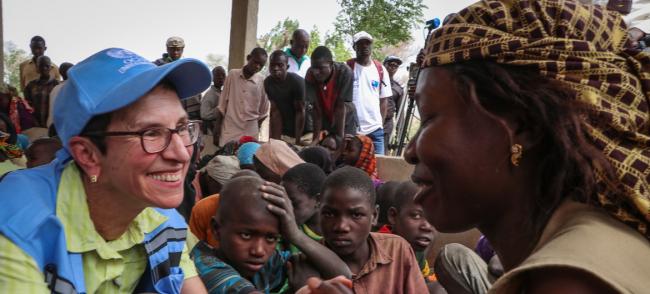
In Cameroon, UN deputy aid chief urges assistance as insecurity deepens in Lake Chad basin
New York, Feb 27 (JEN): Amid growing insecurity in Lake Chad, a senior United Nations relief official on Monday said the international community and the Government of Cameroon must step up support for humanitarian action in the country, which is most affected by regionwide violence sparked by Boko Haram.
“The Lake Chad crisis and violence in the sub-region are far from over said Deputy Emergency Relief Coordinator Ursula Mueller as she wrapped up a four-day visit to Cameroon.
“The international community cannot spare any effort,” she added. “Violent attacks by armed groups, mostly affiliated to Boko Haram, have increased over the past year and I have seen its direct impact and growing humanitarian needs in the Far North of Cameroon.”
In Cameroon, Ms. Mueller met with the minister of External Relations and the governor of the Far North.
Visiting the Zamai internally displaced people (IDP) site and Minawao refugee camp, she saw first-hand the impact of the deteriorating security situation in the Lake Chad basin.
In the region, Cameroon is most affected by the Boko Haram conflict, which started in Nigeria’s northeast nine years ago.
More than 60 suicide attacks were conducted in the Far North in 2017 – a 50 per cent increase compared to the previous year.
Mueller recounted the story of a family in the Zamai IDP camp, in which the mother, Sara, and her baby had been kidnapped by and escaped from Boko Haram, saying that she had no idea of her husband’s whereabouts nor whether he was even still alive.
“We need to be able to provide food, water and other life-saving assistance, as well as protection, to women and men like Sara and her ten-month-old baby,” explained Ms. Mueller. “The response to increased forced recruitment and violent attacks should also be increased solidarity with those affected by crises.”
She underscored that this area needs greater attention, including from donors.
“Security and access are major challenges but the lack of funding remains, by far, the main impediment to humanitarian aid reaching those most in need,” flagged Ms. Mueller.
Currently, the Humanitarian Response Plan proposed by the UN and its partners have only received five per cent of the $305 million required.
In Cameroon, 3.3 million people need urgent humanitarian assistance. In the Far North, one-out-of-three people, or 1.5 million people, are now food insecure at crisis and emergency levels.
Between an increased influx of refugees from the Central African Republic and socio-political tensions in the northwest and southwest regions, the Deputy Relief Coordinator’s visit also provided an opportunity to discuss other crises facing the country.
She emphasized that UN’s deep concern about the situation in Cameroon, including in the south- and north-west.
“We are again calling on all parties to avoid further escalation of violence and to protect civilian populations,” said Ms. Mueller.
“Further fact-finding missions will be taking place as early as next week and we are putting into place assistance to the internally displaced persons, who are estimated in the tens of thousands,” she concluded.
OCHA/Eve Sabbagh
Support Our Journalism
We cannot do without you.. your contribution supports unbiased journalism
IBNS is not driven by any ism- not wokeism, not racism, not skewed secularism, not hyper right-wing or left liberal ideals, nor by any hardline religious beliefs or hyper nationalism. We want to serve you good old objective news, as they are. We do not judge or preach. We let people decide for themselves. We only try to present factual and well-sourced news.







